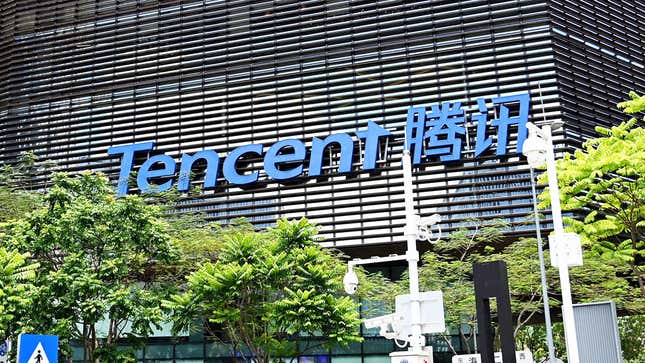
Bloomberg reports that the value of China’s largest gaming companies, Tencent and NetEase, plummeted dramatically during an overnight stock selloff, resulting in losses totaling more than $60 billion between the two. To put that in perspective, that’s about eight times what Microsoft spent on Bethesda Softworks parent company Zenimax Media last fall and $15 billion more than Roblox’s initial valuation earlier this year.
Investors were apparently spooked by China’s increasing regulations on its video game industry. In addition to putting restrictions on the amount of time children under the age of 18 can play games in the country, Chinese state media Xinhua News Agency indicates that government officials met with industry executives on Wednesday. During this meeting, officials directed them to avoid a “solitary focus” on profit, which they argued may lead to designing mechanics that promote addiction in minors.
“The authorities ordered the enterprises and platforms to tighten examination of the contents of their games,” Xinhua added. “Obscene and violent content and those breeding unhealthy tendencies, such as money-worship and effeminacy, should be removed.”
South China Morning Post also notes that China is slowing down the issuing of licenses for new online games, which must be approved by government regulators before release. China’s National Press and Publication Administration, which handles these licenses, has yet to provide the list of approved titles for August, breaking from a tradition of promptly disclosing such information at the end of each month.
State-run newspaper The Economic Information Daily (which, as it turns out, is published by the aforementioned Xinhua News Agency) decried gaming’s effects on Chinese youth in early August, equating the pastime to “spiritual opium.” Much like today’s developments, these statements were considered a reflection of the feelings of the Chinese government and prompted investors to back away from the nation’s burgeoning gaming industry for a time.
This volatility may be part of the reason why Tencent has spent much of 2021 so far investing in (and sometimes completely buying out) foreign video game studios. The massive company most recently acquired stakes of various sizes in developers like Klei Entertainment, Dontnod Entertainment, and Bohemia Interactive, and even made an offer of $1.3 billion for Sumo Group out of the United Kingdom.
“We believe in healthy game play and take very seriously the physical and mental health of minors,” Tencent told Bloomberg earlier today. “We appreciate the guidance and instruction from the relevant regulators, and will work hard to be in full compliance with all rules relating to youth game addiction and content regulation.”